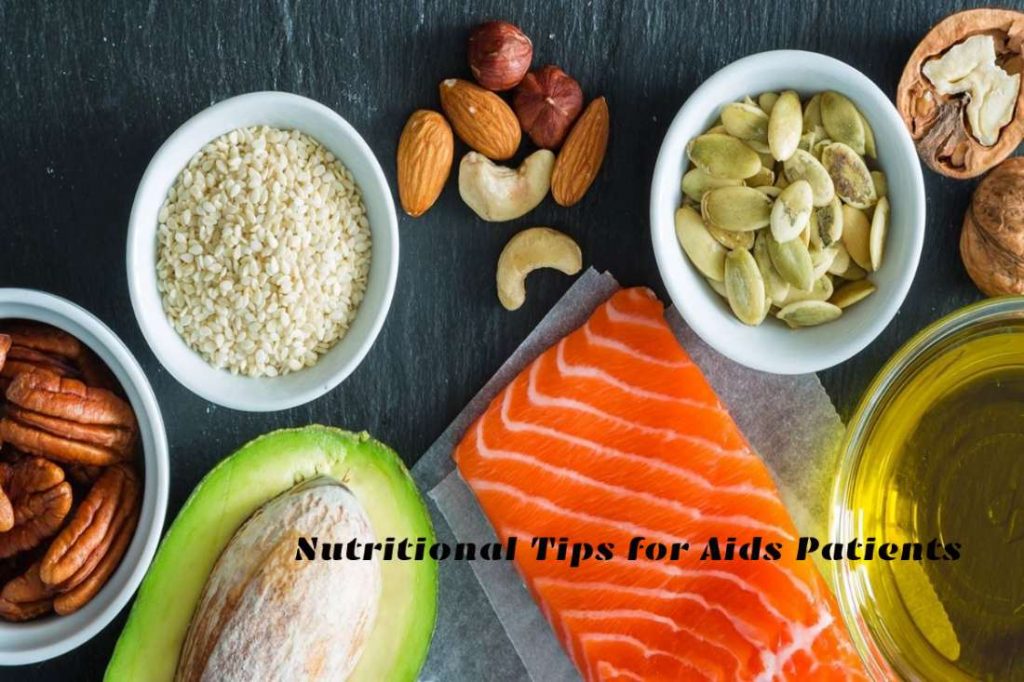Table of Contents
Introduction
Health nutrition plays an important role in promoting the health of aids patients and should be given special attention, as the worst symptoms of aids may be associated with the risk of malnutrition.
There are a set of fundamental principles in the nutrition of aids patients if adopted by the patient as a lifestyle that will improve his quality of life and will be able to protect himself from complications; and here are the most important nutritional tips for aids patients:
Adopt a healthy diet balanced with suitable and calculated calories, covering all the necessary nutrients and food groups of proteins, carbohydrates, and good fats.
Adopt a low-fat, saturated and harmful system that contains beneficial and healthy fat sources.
Take up sources of low-fat proteins, especially animal ones, such as red meat, dairy, and dairy products.
Divide your meals into several meals during the day, including three main meals and two snacks.
Eat a diet high in dietary fiber derived from vegetables, fruits, legumes, and whole grains.
Reduce the sources of simple and refined sugars, such as juices, soft drinks, and sweets.
Essential Nutrients For Aids Patients
After mentioning nutritional advice for aids patients in general, the vital nutrients will be noted, and the need for aids patients will be detailed as follows:
1. Proteins
Proteins and amino acids are essential for the body and for building cells and muscles, and for a robust immune system, and aids patients have particular recommendations on the quantities they should take as
follows:
Men: 100-150 grams per day.
Women: 80-100 grams per day.
In the case of aids patients with kidney problems, eating high amounts of protein can weigh on the kidneys, so recommendations are that the number of calories derived daily from protein should not exceed 15-20%.
Nutritional advice for aids patients regarding proteins is not over as the following advice should also be followed:
Eat proteins from various sources while ensuring low in fat, such as fish, dairy, meat, and low-fat poultry.
Focus on plant sources of proteins, such as legumes, whole grains, and vegetables.
2. Carbohydrates
Carbs are the chief source of energy, and nutritional advice for aids patients and others has been to follow the following:
Focus on the complex fiber-rich carbohydrates away from simple sugar sources, such as brown rice, oats, barley, and various legumes.
Focus on diversifying carbohydrate varieties.
Eat at minimum 4 to 5 servings of carbohydrates per day.
If an aids patient has diabetes, it is worth paying attention to the carbohydrate servings consumed and organizing them by consulting a dietitian.
3. Fat
Fat is an important energy source, and nutritional advice for aids patients regarding fats is:
Focus on choosing healthy and beneficial types of fat, such as sources of trans and mono fats, such as:
Nuts.
Avocado.
Olive oil.
Fish.
Flaxseed.
Corn.
Avoid all sources of saturated fat, such as butter, margarine.
It is usually recommended that 30% of the calories consumed daily be fat, making up:
monounsaturated fats account for 10% of them.
She saturated fat 7%.
How To Cope With Aids Symptoms With Proper Nutrition
nutritional advice for them is not over as the most common symptoms of it will be mentioned, and each presentation follows an appropriate method of food to reduce it:
1. Nausea And Vomiting
Nutritional advice for aids patients with nausea and vomiting:
Avoid high fat and fast foods, such as pans and fast food.
Eat several small meals during the day, i.e., every hour to two hours of a meal, taking a break between meals.
Avoid foods with solid aromatherapy and spicy foods.
Focus on cold foods.
Eating certain foods, in particular, may reduce nausea or the desire to vomit, such as ginger and salty biscuits.
2. Weight Loss in Aids Patients
Nutritional advice for aids patients with weight loss is:
Focus on eating high amounts of whole carbohydrates and low-fat protein sources.
Eating honey and adding it to meals is high in calories and is a natural antibiotic that enhances immunity.
Focus on eating fruits, nuts, and healthy meals rich in calories and nutritional value.
Research with your doctor on a suitable aperitif and about the possibility of taking supplements.
3. Diarrhea in Aids Patients
Nutritional advice for aids patients with diarrhea:
Rely on drinking high amounts of liquids, such as soups, juices.
Avoid sugary drinks, caffeine sources, and fats.
Eat several small meals during the day.
Eat well-cooked vegetables and boiled apples.
4. Anorexia
Nutritional advice for them with anorexia:
Research with your doctor on appetite-stimulating medications.
Avoid drinking fluids before meals.
Eat several small meals during the day.
Eat meals in a family and encouraging atmosphere.
5. Oral And Swallowing Problems
Nutritional advice for aids patients with oral and drinking problems:
Take care to eat soft foods, such as mashed potatoes and yogurt.
Avoid eating raw and fresh foods, and replace them with mashed and cooked foods.
Eat soft and easy-to-swallow fruits, such as bananas.
Avoid acidic foods, such as lemon and orange.
Aids Patients Nutrition Relationship
Nutritional advice for aids patients did not come out of the blue but had a medical role in all of the following:
Preventing the patients from malnutrition.
Enhance the work of the drugs taken and contribute to reducing their side effects.
Help manage symptoms and complications of the disease.
Improve the value of their life them and provide them with the energy to live their daily lives.


